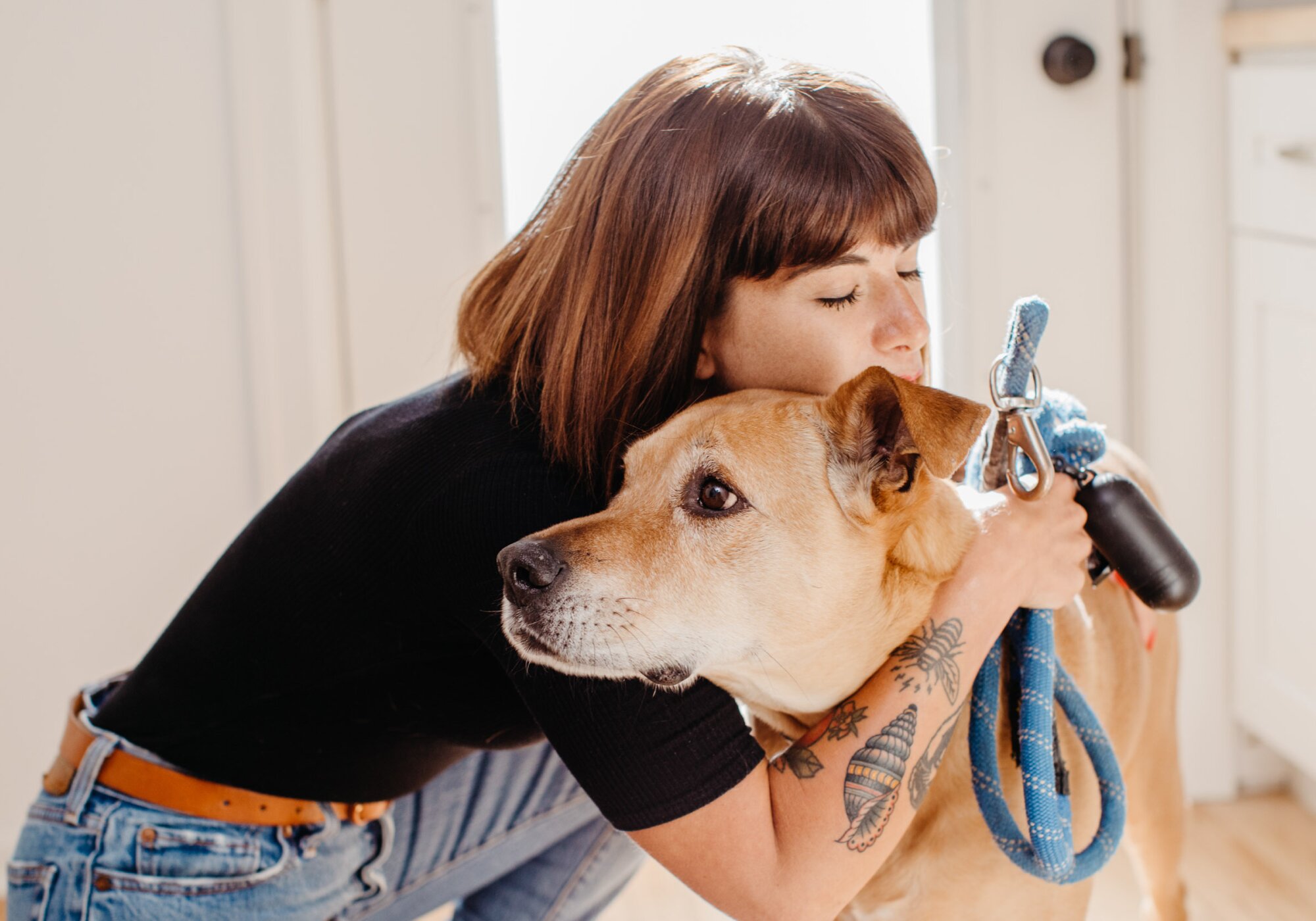If you got your dog as a puppy, you might remember their first dog check-up and the series of shots they received. Now that your dog has grown up, you may be wondering what vaccines your dog needs annually. And, why vaccines are important for dogs and puppies in the first place.
Dog vaccinations protect and build your canine's immunity against disease. Having your dog vaccinated could be the difference between mild and life-threatening symptoms.
Keep reading to learn:
- What are dog vaccinations
- 5 benefits of dog vaccinations
- Types of dog vaccinations
- How often your dog needs vaccines

What are dog vaccinations

An important aspect of pet care is ensuring your canine companion remains healthy. Unvaccinated dogs run the risk of suffering from infectious diseases. Like human vaccines, dog vaccinations help your dog build a healthy immune system.
Dog vaccines contain antigens that mimic disease-causing organisms in your pet's immune system. When your dog is exposed to these antigens, your dog's immune system builds a tolerance to them.
If your vaccinated dog comes in contact with a real disease, their immune system will reduce their illness to mild symptoms. Vaccinations can also help stop an illness in its tracks before symptoms start.
5 benefits of dog vaccinations

Vaccinations are vital to keeping puppies and adult dogs healthy and strong. Besides protection, there are other benefits to sticking to a dog vaccination schedule.
Here are five benefits of having your dog vaccinated.
1. Ensure your dog is happy and healthy.
Vaccinations are essential to your pet's health. Why? Because they build up your dog's immune system.
This is important because unvaccinated adult dogs can suffer from serious diseases, including:
- Bordetella
- Canine influenza (dog flu)
- Lyme disease
2. Save money on medical bills.
Annual booster shots not only keep your dog healthy, but they also save you money on annual tests and exams. Giving your dog vaccines annually prevents disease and the severe to mild symptoms that come with them. This can ensure you spend more time with your pet and less time and money at the vet.
3. Stay compliant with state and local laws.
Owning a dog comes with rules and responsibilities outside of proper dog training. It's important to remember that dogs need to be compliant with state and local laws. Vaccinating your dog is a great way to make sure they are.
Most states require rabies vaccinations for all registered dogs after they reach a certain age — usually after three months of age. Other regulations and state law include periodic booster immunizations for rabies vaccinations.
4. Safeguard your dog from other pets.
Protecting your dog from infectious disease-causing organisms also protects other pets. This is because it’s not always easy to know if other dogs and cats are vaccinated. Sticking to an adult dog vaccination schedule will protect your dog.
Vaccines can help protect against diseases easily spread in social settings like:
- Dog parks
- Dog bars
- Overnight boarding
- Doggy daycare
Most overnight boarding kennels, dog bars, and doggy daycares require certain dog vaccinations. Talk to your boarding kennel or daycare about specific vaccination requirements.
5. Protect yourself and your family from disease.
To be the best pet parent possible, you need to be safe and healthy too. You may not know it, but you can also be at risk of exposure to the same diseases as your pet.
Most diseases, like rabies, canine influenza, and others, are completely preventable diseases. Dog vaccines are a great way to reduce your exposure to the same diseases your dog encounters. After all, responsible puppy care starts by getting your puppies vaccinated.

Types of dog vaccinations

Now you know the importance of protecting your pet with vaccines. But, what vaccines do dogs need to stay healthy?
There are many types of vaccinations that your dog can benefit from. The two main types of vaccines are core and non-core vaccinations.
Core dog vaccinations
Core vaccinations are ones that are recommended for all dogs. Here are the core pet vaccines dogs need.
Rabies vaccine
Rabies vaccines are extremely important for your canine. Vaccination protocol in most states requires the first puppy rabies vaccine at around 16 weeks. After that, your dog will need an annual rabies vaccination booster at age one and beyond.
Canine distemper
Distemper is one of the most serious diseases your dog can contract. Dogs infected by distemper can shed the virus for up to several months. The easiest way to prevent distemper in your dog is through the distemper puppy vaccines.
Administered between six to eight weeks of age, the distemper shot protects your dog from:
- Canine distemper virus
- Hepatitis
- Respiratory disease
- Parainfluenza
- Canine parvovirus
Parvovirus
This core dog vaccine is given between six to eight weeks of age. Typically before your puppy is old enough to have the DHPP vaccine administered. Parvovirus affects your dog's gastrointestinal tract and is spread by contact with:
- Feces
- Contaminated environments (like kennels)
- Contaminated surfaces (like food and water bowls)
- Hands and clothing of people who handle infected dogs
- Other infected dogs or animals
DHPP
The DHPP vaccine is administered at 10 to 12 weeks of age. Your puppy will need a booster at 16-18 weeks, then once a year after they turn one year old.
DHPP protects your canine companion from:
- Distemper (D)
- Canine hepatitis (H)
- Parvovirus (P)
- Parainfluenza (P)
Non-core vaccinations
There are certain dog vaccines you can choose to get at your vet’s office. These are called non-core vaccines. They are optional dog vaccines that are recommended based on your pet's unique medical history and lifestyle.
The following dog vaccinations are not required by law but they do protect your pet from infectious diseases.
Bordetella (kennel cough)
The Bordetella vaccine wards off a frequent illness in dogs called kennel cough. Kennel cough is highly contagious and easily spread. In healthy adult dogs, Bordetella is not life-threatening.
Parainfluenza
Parainfluenza is a contagious respiratory virus spread between dogs. Symptoms can vary in intensity and mostly affect younger puppies and aging dogs. The DHPP vaccine protects against parainfluenza. So, you may not need a specific vaccine for this if your dog is vaccinated with DHPP.
Leptospirosis/Lyme vaccine
The Lyme disease vaccine protects against a bacterial infection transmitted from a tick bite. If left untreated it can be life-threatening for your dog. Adult dogs who spend a lot of time outdoors may be good candidates for Lyme disease vaccines. Consider a topical flea and tick treatment for added protection.
Canine coronavirus
The coronavirus vaccine for dogs protects against a strain of coronavirus (CCoV) spread between dogs. This disease is infectious, but not usually life-threatening.
Canine influenza
The canine influenza vaccine protects against viruses H3N8 and H3N2. Like humans, the canine influenza vaccine protects your dog from the flu if they receive it each year. The vaccine can reduce the risk of your dog contracting influenza, but it may not altogether prevent an infection.
Rattlesnake vaccine
Rattlesnake vaccines are preventative, meaning they help your dog build antibodies to rattlesnake venom. This vaccine helps protect your dog from bites that may happen in the future. If your pet spends time in areas where snakes are prominent, you may want to consider this vaccine.
VET TIP
Non-core vaccines are beneficial to dogs who live specific lifestyles. Not every dog needs them, but they can prevent diseases that are more prominent because of where and how you live. Ask your vet if your dog's lifestyle fits a need for specific vaccinations.
How often do dogs need vaccines

Dog vaccinations vary by:
- The way in which they are administered
- Your dog's age
- Your location
- Your and your dog's lifestyle
According to the American Animal Hospital Association, this vaccination schedule is a good starting point for your dog:
| Age | Core Vaccinations | Non-Core Vaccinations |
|---|---|---|
| 6-8 weeks |
|
|
| 10-12 weeks |
|
|
| 16-18 weeks |
|
|
| 12-16 months |
|
|
| Every 1-2 years |
|
|
| Every 1-3 years |
|
Puppy vaccination schedule
If you have a new puppy, you might be wondering when it is time to start puppy vaccinations. Core puppy vaccinations protect your pet from common deadly puppy diseases. Aside from the core vaccines your dog needs, you can choose to give your dog non-core vaccinations.
Core puppy vaccines are administered on a schedule until your dog is roughly one year old. At six weeks of age, your pet can receive three puppy vaccinations:
- Distemper
- Parvovirus
- Bordetella
According to a standard puppy vaccine schedule, they can receive the rabies vaccination when they are around 16 weeks old. After your puppy grows into an adult dog, they will need to follow an annual booster vaccination schedule. This depends on your state's requirements.
Adolescent or adult dog vaccination schedule
While many vaccines are only necessary for puppies, there are some they'll need when they become adult dogs. After the first round of vaccinations, there are a handful of vaccinations your adult dog needs every few years.
An adult dog vaccination schedule consists of:
- An annual rabies vaccine
- An annual DHPP vaccine
VET TIP: DEALING WITH VACCINE REACTIONS
The most common side effect is lethargy. This shows your dog's immune system is responding to the vaccination and working. Your dog may also experience mild side effects like diarrhea, pain at the injection site, or a mild fever. These reactions are normal and should only last one or two days. If they last longer, contact your veterinarian immediately.

Sticking to a puppy vaccination schedule will limit the risk of your puppy contracting a serious disease. The best way to stay on track with puppy vaccinations is to follow the schedule your vet recommends.
Canine vaccinations help prevent life-threatening illnesses in most dogs when given regularly. Help your pup stay happy and healthy by sticking to a regular vaccine schedule.

